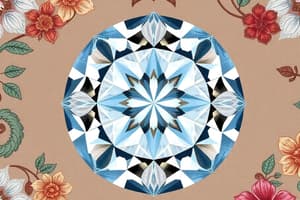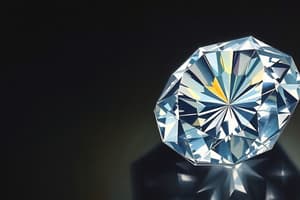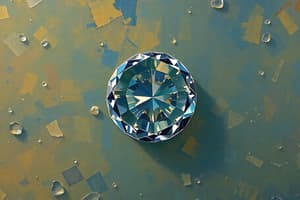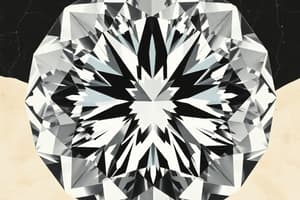Podcast
Questions and Answers
What is the first step in determining the average girdle diameter of a round brilliant diamond?
What is the first step in determining the average girdle diameter of a round brilliant diamond?
- Calculate the total depth percentage to assess the weight.
- Measure the depth from table to culet.
- Determine the table percentage based on the girdle diameter.
- Add the smallest and largest diameter measurements and divide by two. (correct)
What indicates a diamond is likely underweight based on total depth percentage?
What indicates a diamond is likely underweight based on total depth percentage?
- Total depth percentage of 70.0 percent or more.
- Total depth percentage between 60.0 and 65.0 percent.
- Average girdle diameter measurement below 5 mm.
- Total depth percentage below 55.0 percent. (correct)
If measuring the total depth of a diamond to calculate total depth percentage, how should the final result be reported?
If measuring the total depth of a diamond to calculate total depth percentage, how should the final result be reported?
- As a fraction of the average girdle diameter.
- Rounded to the nearest tenth of a percent. (correct)
- Rounded to the nearest whole number.
- As an exact whole number.
Which range of table percentages is most common for round brilliant diamonds?
Which range of table percentages is most common for round brilliant diamonds?
What measurement tool is necessary to measure a diamond’s table accurately?
What measurement tool is necessary to measure a diamond’s table accurately?
What percentage indicates that the table bows out noticeably?
What percentage indicates that the table bows out noticeably?
Which crown angle range is generally considered attractive for diamonds?
Which crown angle range is generally considered attractive for diamonds?
How should table percentages be adjusted based on star length?
How should table percentages be adjusted based on star length?
Which method is used to estimate the crown angle by observing the diamond under magnification?
Which method is used to estimate the crown angle by observing the diamond under magnification?
What is the common range for star length percentages?
What is the common range for star length percentages?
Which crown proportion is generally deemed more significant in the diamond trade?
Which crown proportion is generally deemed more significant in the diamond trade?
What happens to the appearance of a diamond if the crown angle is below 25 degrees?
What happens to the appearance of a diamond if the crown angle is below 25 degrees?
In the Face Up Method, what does the comparison of widths help determine?
In the Face Up Method, what does the comparison of widths help determine?
What is one of the primary functions of the girdle in a diamond?
What is one of the primary functions of the girdle in a diamond?
Which architectural feature of a diamond is typically assessed at the valley positions of the girdle?
Which architectural feature of a diamond is typically assessed at the valley positions of the girdle?
What impact does a thick unpolished girdle have on a diamond's appearance?
What impact does a thick unpolished girdle have on a diamond's appearance?
How is girdle thickness usually reported for diamonds?
How is girdle thickness usually reported for diamonds?
What technique do cutters sometimes use to alter the angles of the diamond to conserve weight?
What technique do cutters sometimes use to alter the angles of the diamond to conserve weight?
What is the purpose of measuring the diamond table from corner to opposite corner four times?
What is the purpose of measuring the diamond table from corner to opposite corner four times?
What is the effect of a shallow crown angle on the characteristics of a diamond?
What is the effect of a shallow crown angle on the characteristics of a diamond?
What is the primary factor used to determine the crown height percentage of a diamond?
What is the primary factor used to determine the crown height percentage of a diamond?
What does the term 'table percentage' specifically refer to?
What does the term 'table percentage' specifically refer to?
Which method might a polisher use to create thinner girdle positions on a diamond?
Which method might a polisher use to create thinner girdle positions on a diamond?
When using the bowing method to evaluate a diamond, what should you look for?
When using the bowing method to evaluate a diamond, what should you look for?
Which flash size indicates that the diamond's table size is likely less than 60 percent?
Which flash size indicates that the diamond's table size is likely less than 60 percent?
Why is it important to inspect the entire circumference of a diamond's girdle?
Why is it important to inspect the entire circumference of a diamond's girdle?
What is the consequence of using excessive thickness in a diamond girdle?
What is the consequence of using excessive thickness in a diamond girdle?
In the ratio method, what does a 1:1 ratio indicate about the diamond?
In the ratio method, what does a 1:1 ratio indicate about the diamond?
What contributes to an accurate estimate of table size using the flash method?
What contributes to an accurate estimate of table size using the flash method?
Which of these methods would you use if you are looking at the diamond under magnification with darkfield lighting?
Which of these methods would you use if you are looking at the diamond under magnification with darkfield lighting?
To achieve an accurate Diamonds Table Percentage, which values are needed for the calculation?
To achieve an accurate Diamonds Table Percentage, which values are needed for the calculation?
What does it imply if the table size is evaluated to be in the range of 65 percent or greater using the flash method?
What does it imply if the table size is evaluated to be in the range of 65 percent or greater using the flash method?
Which of the following statements is true regarding the function of the girdle?
Which of the following statements is true regarding the function of the girdle?
How many crown angles on a round brilliant diamond should be estimated before averaging?
How many crown angles on a round brilliant diamond should be estimated before averaging?
Flashcards
Table Percentage
Table Percentage
The percentage of the diamond's diameter that the table facet covers.
Star Length Percentage
Star Length Percentage
The percentage of the distance between the girdle edge and table edge that the star facets cover.
Crown Angle
Crown Angle
The angle created by the bezel facets and the girdle plane of a diamond.
Crown Height Percentage
Crown Height Percentage
Signup and view all the flashcards
Profile Method (Crown Angle)
Profile Method (Crown Angle)
Signup and view all the flashcards
Face-Up Method (Crown Angle)
Face-Up Method (Crown Angle)
Signup and view all the flashcards
Diamond Proportions
Diamond Proportions
Signup and view all the flashcards
Diamond Facet Estimation
Diamond Facet Estimation
Signup and view all the flashcards
Shallow Crown Angle
Shallow Crown Angle
Signup and view all the flashcards
Girdle
Girdle
Signup and view all the flashcards
Girdle Thickness
Girdle Thickness
Signup and view all the flashcards
Girdle Assessment
Girdle Assessment
Signup and view all the flashcards
Valley Positions
Valley Positions
Signup and view all the flashcards
Hill Positions
Hill Positions
Signup and view all the flashcards
Painting
Painting
Signup and view all the flashcards
Digging Out
Digging Out
Signup and view all the flashcards
Thickness Variations
Thickness Variations
Signup and view all the flashcards
Average Girdle Diameter
Average Girdle Diameter
Signup and view all the flashcards
Total Depth Percentage
Total Depth Percentage
Signup and view all the flashcards
Diamond Measurement Units
Diamond Measurement Units
Signup and view all the flashcards
Average Table Diameter
Average Table Diameter
Signup and view all the flashcards
Flash Method
Flash Method
Signup and view all the flashcards
Small Flash
Small Flash
Signup and view all the flashcards
Medium Flash
Medium Flash
Signup and view all the flashcards
Large Flash
Large Flash
Signup and view all the flashcards
Ratio Method
Ratio Method
Signup and view all the flashcards
1:1 Ratio
1:1 Ratio
Signup and view all the flashcards
Bowing Method
Bowing Method
Signup and view all the flashcards
Table Size Estimation
Table Size Estimation
Signup and view all the flashcards
Study Notes
Diamond Grading Proportions - Table, Crown, Girdle
- Average Girdle Diameter: Calculated by averaging the smallest and largest girdle diameter measurements of a round brilliant.
- Total Depth Percentage: Represents the diamond's table-to-culet depth as a percentage of its average girdle diameter. Measure from the table to the culet with a millimeter gauge.
- Underweight Diamonds: Have total depth percentages below 55.0%, often characterized by shallow crowns and/or pavilions.
- Overweight Diamonds: Have total depth percentages of 65.0% or more, often characterized by steep crowns and/or deep pavilions.
- Table Percentage: The table size expressed as a percentage of the average girdle diameter. Most round brilliants have table percentages between 55 and 65 percent. Fancy shapes might have slightly smaller or larger tables.
Direct Table Measurement
- Measuring the Table: Use a transparent millimeter gauge to measure the table facet from corner to corner four times.
- Average Table Diameter: Calculating the average table diameter: (sum of four table measurements) ÷ 4
- Table Percentage Calculation: (Average Table Diameter ÷ Average Girdle Diameter) × 100
Estimating Table Percentage
- Flash Method: The size of the light reflected off the table gives a visual estimate of the percentage. Small flash = under 60%. Medium flash = ~60-64%. Large flash = over 65%.
- Ratio Method: Compare the culet and outer parts of the diamond measured under magnification, both should have the same length for a 1:1 ratio.
- Bowing Method: Inspect the straightness of lines between star facets on the table. Straight lines = ~60%, Slightly bowing in = ~58%, Slight bowing out = ~63%, Significant bowing out = ~67%.
The Crown
- Crown Angle: Angle formed by the girdle plane and the bezel facets.
- Crown Height Percentage: Distance from the girdle plane to the table expressed as a percentage of the average girdle diameter. Crown angles from 25 to 35 degrees are generally preferable.
The Girdle
- Girdle Function: Prevents damage and provides a setting edge. Thick girdles add weight without much visual impact.
- Girdle Thickness Assessment: Evaluate the thickness of the girdle's "valleys and hills" under a 10x magnification to assess the thickness.
- Painted/Digging out of Facets: Techniques used to selectively remove or adjust facet thickness. The process of painting allows light to be gently polished to remove less thickness from certain areas whereas digging out allows facets to be tilted towards one another or away to change areas of thickness.
Studying That Suits You
Use AI to generate personalized quizzes and flashcards to suit your learning preferences.




